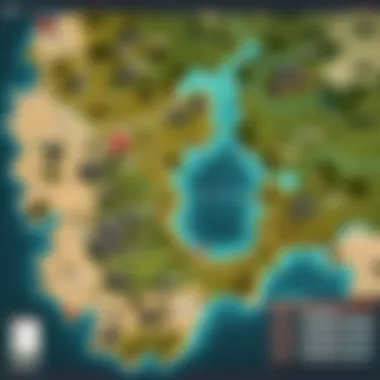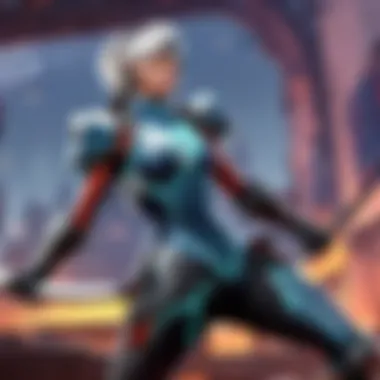Mastering the NA Schedule for Valorant Players


Game Overview
Foreword to Valorant
Valorant is a tactical first-person shooter developed by Riot Games. Released in June 2020, this game has quickly gained a dedicated player base. Combining elements of traditional shooting games with unique character abilities, Valorant presents a strategic battleground where players must work together to outsmart their opponents. The team-based format fosters both collaboration and competition.
Game Mechanics and Objectives
In Valorant, two teams of five players compete against each other. One team takes on the role of attackers, while the other defends. The primary objective is to plant or defuse a device known as the Spike. Each round features a new opportunity for players to employ tactics, utilize their agents' abilities, and adapt their strategies based on the evolving circumstances of the match.
Brief History of the Game
Valorant's development stemmed from Riot Games' interest in the competitive gaming landscape. The closed beta phase allowed players to experience its mechanics before official launch. Since then, frequent updates and community feedback have shaped its current form. Valorant has become a significant player in the esports domain, showcasing various tournaments and a robust player community.
List of Playable Agents and Their Unique Abilities
Valorant features a diverse cast of agents, each with distinct abilities that influence gameplay. Currently, there are over ten agents, representing different roles:
- Duelists: Focused on aggressive play and fragging.
- Controllers: They manipulate the battlefield, controlling sightlines and choke points.
- Initiators: Assist teammates with information and utility.
- Sentinels: Provide support through healing and defensive tactics.
Each agent's abilities can significantly impact team dynamics and tactics, making proper agent selection crucial.
Strategy Guides
Tips for Beginners
New players often face challenges adapting to Valorant's mechanics. Understanding basic movement, aiming techniques, and map awareness is essential. Beginners should practice their shooting in designated practice ranges and explore various weapons to find their preferred style.
Advanced Tactics for Experienced Players
Seasoned players should focus on communication and team coordination. Making callouts and understanding opponent patterns can lead to strategic advantages. Learning to manage economy, deciding when to buy weapons or save, is vital in larger matches.
Map-Specific Strategies
Valorant features several maps, each requiring different strategies:
- Bind: Focus on teleporters for flanking and surprise tactics.
- Haven: Utilize its three bomb sites to confuse opponents.
- Split: Leverage verticality with agents that can climb or raise platforms.
Agent-Specific Tactics and Playstyles
Every agent offers unique gameplay opportunities. For example, Jett excels in mobility, allowing for swift kills, while Sova provides essential intel through his scouting abilities. Understanding these nuances can dictate team strategies and individual contributions.
Patch Updates
Summary of Recent Game Patches
Frequent patches keep Valorant fresh. Recent updates have introduced adjustments to agent abilities, weapon balancing, and graphics improvements. Staying informed on these patches is crucial for leveraging new strategies.
Analysis of Changes to Agents, Weapons, and Maps
Each patch can change the meta. For instance, a buff to a specific agent can increase their pick rate in competitive matches. Understanding each patch's details can aid players in adapting their tactics accordingly.
Community Feedback on Patch Notes
Community discussions on platforms like Reddit and Facebook often highlight varied opinions. Listening to player feedback ensures that both developers and players align on desirable changes in the game.
Predictions for Upcoming Updates
Speculations about future updates often arise from changes in gameplay and community needs. Anticipating how these might affect various agents or strategies can keep players one step ahead.
Esports Coverage


Overview of Recent Valorant Esports Events
Competitive Valorant has seen explosive growth since its release. Tournaments organized by companies such as Riot Games have showcased top-tier talent and engaging matches. Players are drawn to the pressure and excitement of professional plays.
Tournament Predictions and Analysis
As upcoming tournaments loom, analyzing team performance and strategies can yield insights into likely outcomes. Understanding team compositions and historical matchups can guide viewer expectations.
Insights on Current Professional Meta
Professional play often dictates shifts in the meta. Agents gaining popularity in pro matches may eventually influence casual gameplay preferences.
Player Community
Featured Player Highlights
Valorant's community is filled with talented players. Highlighting their achievements fosters inspiration among casual gamers and competitive players. Many streamers offer educational content based on their experiences.
Community-Created Content Showcase
Players continually generate vibrant community content. From fan art to guides, these contributions enrich the Valorant experience and showcase player creativity.
Forum Spotlight on Trending Topics
Discussing strategies, patch notes, or community events on forums helps players engage and learn. Understanding trending topics in the community can lead to valuable insights and improvement in gameplay.
Intro to the NA Schedule
The NA schedule in Valorant holds great significance for players aiming for competitive success. Understanding it thoroughly allows players to strategize effectively, aligning their practice and gameplay with key tournaments and matches. Detailed knowledge of the schedule can offer insights into the timing of events and the structure of tournaments, which are crucial for any player seeking to enhance their performance.
Overview of Valorant's Competitive Structure
Valorant's competitive landscape is organized around a series of events that range from local tournaments to global championships. The backbone of this competitive scene is the Valorant Champions Tour (VCT), which features multiple stages and qualifiers. Each stage brings its own set of matches, determining which teams advance and how rankings are established.
The yearly cycle of VCT involves different splits, with each split allowing teams to earn points and secure their positions. Players must keep themselves updated on the schedule, particularly during these critical phases. The progression through these events is not just about participation; it also involves adapting to evolving game metas and preparing for the diverse playstyles exhibited by competitors.
Importance of Regional Schedules
Regional schedules play a vital role in shaping competitive strategies. In North America, the schedule dictates when and how teams compete to establish themselves in the scene. Understanding these schedules allows players to pinpoint essential events and manage their time effectively.
Moreover, regional schedules often reflect broader trends in the competitive landscape, such as emerging tactics or shifts in player performance. This knowledge is paramount as it not only informs practice schedules but also enhances awareness regarding key matchups and rivalries in the region.
- Leverage Match Timing: Knowing when specific matches take place can help players prepare mentally and physically.
- Anticipate Meta Changes: Being aware of regional events can inform players on potential shifts in strategies and tactics.
Ultimately, the mastery of the NA schedule is not just about knowing when to play; it is about forming a competitive edge through careful preparation and strategic planning.
Key Components of the NA Schedule
The NA schedule serves as the backbone for Valorant's competitive scene, guiding players through layers of strategy and preparation. Understanding the key components of this schedule is essential for anyone looking to enhance their gameplay. It provides insights into match timings, formats of tournaments, and the overall organization within the North American region. Embracing these aspects can significantly impact a player's competitive edge.
Match Timing and Time Zones
In the realm of esports, timing is everything. Match timings dictate not only when players need to be ready but also how they must manage their practice sessions.
Valorant operates on multiple time zones, primarily based in North America. This creates a challenge for both players and fans. Players must be aware of the timezone they are in and how it correlates with scheduling. For instance, matches may be set for Pacific Time which can affect players in Eastern Time. A simple error in calculation can be disasterous.
Additionally, adapting to various time schedules is crucial in maximizing performance. Players should consider shifting their practice times to align closer to match timings. Doing so acclimatizes their body and mind to be in the right state for competition. It allows for focus and reduces the risk of fatigue. Awareness and preparation around match timing is an essential practice for gamers of all levels.
Tournament Formats in the NA Region
Understanding tournament formats is as important as knowing the schedule itself. For NA Valorant players, tournaments may differ significantly in their structure. Some common formats include single elimination, double elimination, and Swiss formats. Each of these formats has its implications and strategies.
For instance, in a single elimination tournament, the pressure intensifies as one loss eliminates a team. This format requires teams to be on their best game each match. Conversely, a double elimination format allows for a loss without immediate disqualification. This can offer teams a chance to regroup and adjust strategies. It is vital for players to be aware of the formats they are competing in, as this knowledge can influence their training and gameplay choices.


"Understanding tournament formats provides teams with the ability to adapt strategies based on required performance."
Moreover, the regional qualifiers also adhere to unique rules and structures. Some may prioritize points systems while others rely on direct wins. This calls for a strategic planning approach. Players must adapt their methods accordingly. Integrating knowledge of tournament formats can bolster a team’s chances for success in the NA tournaments.
The combination of understanding match timings and recognizing tournament formats forms the cornerstone of mastering the NA Schedule. As players navigate these key components, they must remain flexible and strategic, ready to implement changes as circumstances demand. Preparing effectively fosters a competitive mindset and ultimately enhances performance in the field.
Analyzing the Seasonal Schedule
The seasonal schedule in Valorant provides players with key insights into how the game changes over time. Understanding this aspect of the NA schedule is essential. It not only allows players to be more prepared for upcoming matches but also helps them to adapt their strategies based on the game’s evolving landscape. Analyzing the seasonal schedule offers a clear view of how competitive play is structured and what factors to consider when planning practice sessions and gameplay tactics.
Understanding Split and Stage Dynamics
Valorant employs a split and stage system that significantly affects competitive play. Each competitive season includes multiple splits, which provide new maps, agents, and gameplay dynamics. Players should grasp how these splits influence match outcomes. For example, shifts in the map pool can alter team strategies and preferred agents. Furthermore, teams must consider split timing as certain teams may excel on particular maps due to their play style or agent compositions.
To effectively analyze these dynamics, teams can follow several approaches:
- Study Previous Matches: Review past performances during different splits to identify how teams adapted.
- Monitor Agent Usage: Observe which agents are consistently played and which ones fall out of favor, signaling shifts in the meta.
- Engage in Scrimmages: Use practice matches to experiment with new strategies during split transitions, enhancing readiness.
Predicting Meta Shifts Through Timing
Timing has a profound effect on the trajectory of the competitive meta in Valorant. By analyzing the seasonal schedule, players can anticipate shifts in strategies that might arise due to the introduction of new content or balance changes. For instance, if a new agent enters the fray right before an important tournament, it can drastically change team compositions and strategies.
Understanding how and when these shifts occur can provide a competitive edge. Players should keep in mind the following considerations:
- Observe Content Updates: Pay attention to patch notes from Riot Games, as they will influence agent strength and map dynamics.
- Watch Major Tournaments: Major events showcase how top-tier teams adapt to new content, offering valuable lessons.
- Adapt Playstyle Accordingly: Once a meta begins to shift, individuals and teams alike must adjust their strategies to stay competitive.
"The ability to read the seasonal schedule effectively is akin to having a strategic blueprint for the game. Understanding when to adapt can set apart the good players from the truly great ones."
Ultimately, analyzing the seasonal schedule goes beyond mere recognition of match timings. It develops a strategic mindset and enhances understanding of gameplay, allowing players to stay ahead in the highly competitive landscape of Valorant.
Navigating Through Major Events
Understanding how to navigate through major events in the NA schedule is crucial for any Valorant player. These events are pivotal not only for individual teams but also for the overall competitive landscape. Key tournaments like the Valorant Champions Tour (VCT) often dictate the trajectory of teams, player rankings, and even the meta. Knowing how to prepare for these events can significantly impact a player's performance and their team's success.
VCT and Its Impact on Competitive Play
The Valorant Champions Tour, known as VCT, is at the heart of competitive Valorant in the NA region. This event features the best teams, showcasing exceptional talent and strategic gameplay. Participating in VCT is not just about gameplay; it also has implications for player visibility and future opportunities.
During the VCT, various factors come into play such as:
- Match Stakes: Each match in the VCT holds weight. Wins and losses can affect team standings and qualification for future major events.
- Audience Engagement: With millions tuning in, VCT matches create a platform for players to gain recognition. Performance can lead to sponsorships or contract offers.
- Learning Opportunity: Observing top teams can provide insights into advanced strategies, helping players refine their own approach.
In essence, performing well in the VCT is a doorway to better opportunities. It is not only a test of skill but also of mental fortitude.
Regional Qualifiers and Their Significance
Regional qualifiers serve as an essential stepping stone for teams hoping to make it into major tournaments like the VCT. These qualifiers generate intense competition as they determine which teams will advance.
The significance of regional qualifiers includes:
- Competitive Edge: Qualifiers allow teams to gauge their readiness against strong opponents. They highlight strengths and weaknesses that need addressing.
- Exposure to Different Playstyles: Facing diverse teams during qualifiers enriches a team's strategic repertoire. Adapting to various playstyles is vital for long-term success.
- Crowd Support and Motivation: Competing in front of local fans creates an electrifying atmosphere. It often boosts player performance as they feel the backing of their community.
"Regional qualifiers are a microcosm of what to expect on a larger stage. They test not only skills but also team dynamics and composure under pressure."
Understanding Schedule Changes
In the competitive landscape of Valorant, understanding schedule changes is vital for both casual and competitive players. Schedules can fluctuate due to various factors, affecting match timings and team preparations. Grasping these changes allows players to adapt their strategies and eliminate unnecessary stress prior to important matches.
Dealing with Postponements and Rescheduling
Postponements can come from many sources, including unforeseen circumstances in the gaming environment or logistical challenges. When a match is postponed, teams must remain flexible. They need to maintain a high level of preparedness without knowing the new schedule.


Here are some ways to effectively manage these situations:
- Communication is Key: Teams should stay in constant contact with their players. Open lines of dialogue can alleviate confusion and anxiety.
- Adjust Practice Schedules: Players may need to shift their practice times. This adjustment helps to stay in sync with team dynamics and game conditions.
- Focus on Mental Agility: Getting used to sudden changes can build resilience. This mental toughness is essential for handling competitive pressures.
As an example, consider a recent VCT match that was rescheduled. Teams who adapted quickly were able to shift their strategies, often leading to better performance than those who did not.
Implications of Last-Minute Changes
Last-minute changes can have significant effects on performance. When announcements come shortly before a scheduled match, it can disrupt preparations. Players might feel rushed or anxious.
Some implications of such changes include:
- Increased Pressure: Teams may face more stress with less preparation time. Adjusting strategies on the fly can showcase the team's adaptability but also heighten the stakes.
- Impact on Player Morale: Unexpected changes can affect the mindset of individual players. A positive attitude is necessary, as it directly influences team synergy.
- Strategic Adjustments: Coaches and analysts must provide quick insights into opponents or new map strategies, which can alter the game plan.
"In a game where milliseconds matter, adapting to last-minute changes can be the difference between victory and defeat."
Being aware of how to approach schedule changes can enhance overall performance in Valorant. By adapting promptly, players and teams are more likely to thrive under pressure. Understanding schedule dynamics creates a foundation for success in the game.
Integrating the NA Schedule into Personal Strategy
Understanding and effectively integrating the NA schedule into personal strategy is crucial for agents aiming for success in Valorant. The competitive landscape is not only about individual skill but also about timing and preparation. Each player must consider their play style, team dynamics, and the intensity of upcoming matches. This entails a detailed examination of match timings, practice slots, and personal limits. By aligning one’s routine with the schedule, players can maximize their performance, making strategic adjustments as needed to enhance their gameplay experience and results.
Optimizing Practice Times Based on Schedule
Aligning practice sessions with the NA schedule is imperative for any serious player. First, players need to evaluate when matches are scheduled and plan their practice around these times. This creates a rhythm that allows for focused training times, mirroring real match conditions.
- Mapping Out Match Timings: Knowing when a match begins, players can structure their practice sessions, focusing on key skills or team coordination in the days leading up to the event.
- Adjusting for Rest: An effective schedule includes breaks. Ensuring enough rest before a match can greatly improve performance levels. Schedule high-intensity practice sessions during peak energy times while designating downtime to recharge.
- Utilizing Flexibility: The dynamic nature of the schedule means players can utilize any gaps for additional training. Making the most of these opportunities can lead to enhanced skills and better familiarity with strategies.
By being proactive, players train in ways that are directly relevant to their competitive schedule, thus optimizing their performance.
Psychological Preparation for Key Matches
Mental conditioning is equally crucial as physical training. The pressure of competitive play can be overwhelming without adequate focus and mindset. Here are key strategies:
- Setting Goals: Clearly defined goals for each match can guide players to stay focused. Objectives could range from improving specific skills to communication efficiency during gameplay.
- Visualization Techniques: Visualizing successful gameplay scenarios can help players prepare mentally. Imagining themselves winning can bolster confidence and reduce anxiety before matches.
- Routine Development: Creating a pre-match routine can establish a sense of normalcy. This might include specific warm-up activities that help to settle nerves and build readiness.
"The mind is a powerful tool. It is essential to maintain mental clarity and a positive outlook to perform well in high-stakes matches."
Players should prioritize mental health and approach each match with a clear, focused mind, allowing them to execute strategies effectively.
Integrating the NA schedule into personal strategy involves a thoughtful mix of practice timing and psychological readiness, both essential elements for serious Valorant players seeking success in the competitive arena.
End: The Strategic Importance of the NA Schedule
Understanding the NA schedule is crucial for players who wish to excel in Valorant. The schedule is more than just a series of match times and tournament dates; it has deep implications for preparation, practice, and overall performance. The relationship between match timings and player readiness cannot be overstated. Players must consider how their practices align with the competitive calendar. Knowing when the key matches are can help in tailoring simulations and practicing specific strategies.
Furthermore, adapting to the schedule means anticipating changes and modifying approaches accordingly. This can involve psychological aspects as well, such as ensuring players reach peak focus at critical times. A well-integrated schedule can profoundly affect not just individual players but also team dynamics. Communication and planning around the schedule foster a collaborative environment, where every aspect of play can be optimized.
Players who align their strategy with the NA schedule gain a distinct competitive edge.
Ultimately, mastering the NA schedule is an ongoing process that reflects both the current state of competitive play and future developments within the Valorant scene. Embracing this knowledge will not only enhance gameplay but can also lead to better in-game decision-making during critical moments.
Recap of Key Insights
In reviewing the content presented, several key insights emerge:
- The NA schedule facilitates strategic alignment across practice and competition.
- Taking into account match timings is essential for effective preparation.
- Understanding seasonal changes within the game helps predict shifts in gameplay and strategies.
- Teams can enhance their communications and dynamics by planning around the schedule.
This nuanced understanding allows players to effectively manage their time, ensuring they are not just prepared, but also adaptable to the ever-changing competitive landscape.
Looking Ahead: Future Developments in the NA Scene
As the NA scene continues to evolve, it is important to look onward and anticipate changes. Developments such as new tournaments or shifts in popular formats may require players to evolve their scheduling strategies. The introduction of new agents or game mechanics can also influence how teams structure their preparations.
A few points to consider in looking ahead are:
- Watch for changes in tournament structures, which could shift how teams prioritize their time.
- Keep an eye on meta shifts; understanding these can provide insights into which practices are most effective leading up to key matches.
- Stay informed about community feedback on the game, as this may influence developer decisions and the competitive calendar.
In summary, staying adaptive and aware of future changes will be vital for any player who seeks to maintain a competitive edge in Valorant. By integrating this knowledge and the NA schedule into their performance strategies, players can not only survive but thrive in this dynamic game.



